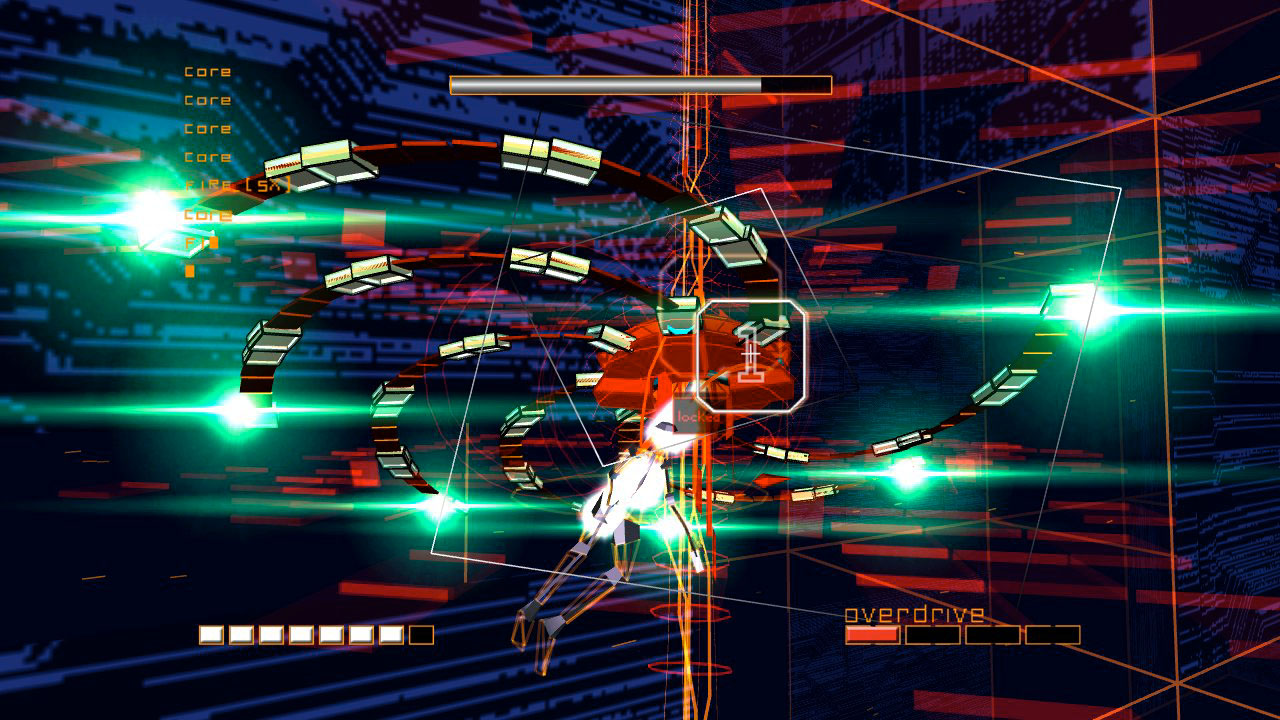
Rez does something that's been seen an awful lot lately – the rhythmic shmup – and while it was definitely the progenitor of this movement, it's actually kind of amazing how fresh it still feels, more than ten years later. This might be a game that sets the player awash in a sea of late-90s hacker-speak and trance music, but it achieves its goal of synesthesia – a perfect balance between its insane visuals and soundtrack.
Often regarded as one of the seminal Dreamcast games in that system's short lifespan, Rez is the creation of Tetsuya Mizguchi, who has been making (you know, some) headlines in the gaming media with his "saviour of Microsoft's 32X", the Kinect-enabled Child of Eden. While Child of Eden seems to be aiming for many of the same goals as Rez (while adding in the added sensation of gesture-based controls), Rez already captures that design philosophy perfectly.
In essence, Rez boils down to a few things. Like the clearly Rez-inspired Bit.Trip Fate, Rez has your avatar continuing on a preset path through a techno nightmare world. The only thing you have control over is your aiming reticule, and as you blast the various ships that head your way, they explode not only into wireframe shards, but they also add to the beat of the music at the same time. Indeed, Rez is as much about music as it is about shooting things, as the game allows you (encourages you, even) to experiment with the music. Shooting becomes a rhythmic experience, and I found myself shooting as much for the musical experience as for the point/gameplay reasons.
The game understands this focus completely – the game never gets very difficult, allowing you to get as much out of it as you put into it. I didn't find the game challenging because I was focused on the music-making aspects of it, rather than trying to wipe out every last enemy, but you could just as easily play this game like a high-score demon and make it a much more overtly arcade-y game, and that would be OK too. As well, the game is also a brilliant length – while some might bemoan the fact that there are only four stages (divided into 10 substages each), it encourages endless replay and perfection/experimentation, and that's a really cool thing. Rez would almost certainly be criticized for being too short these days, but when a game understands what its length should be to such a perfected degree, why isn't that worth the same as a ten hour experience that's filled with unnecessary padding?
In gameplay, aesthetics and execution, Rez is nearly flawless. The game employs an amazing art style that recalls the classic arcade game Radar Scope while pushing that same style into amazing, twisting concoctions that are as surreal as they are indebted to gaming's past and gaming's culture. While the soundtrack is filled with quite dated sounding trance music from the late 90s (part of its charm if we're being honest), everything comes together in magical ways. Flying through the twisting, minimalistic landscapes while actively contributing to the soundtrack is an experience that never gets old.
Most of all, Rez was the first (and arguably the best) game to actively attempt to recreate the sensation of synesthesia, as every aspect of the game is interwoven and dependent on the other. The game is trying to put you in a state of mind, and through its visuals, soundtrack and vibration (yes, even vibration – on the PS2 and XBox 360 versions of the game, you can set up several controllers to vibrate along to the music, providing one of the few essential force feedback experiences in video games).
If Rez fails anywhere, it's something that's only become apparent in more overtly post-modern games such as the aforementioned Bit.Trip games, where synesthesia is the overt goal. In Rez, it's an effect that's achieved and is sustained and was almost definitely intended, but to some degree it's undone by the game's insistence on a frankly unnecessary narrative. More and more, I'm starting to look at games as having far too much context – I likely could have figured out, or at least made up, my own narrative to go along with the suggestive visuals. Instead, the game insists on a kind of "hackers meets trance music" narrative that, even if it's not really overt (thankfully), its presence kind of dilutes the experience. Whereas in Bit.Trip the visuals and the music are all pointing towards one thematic intent (that is, an exploration of the history of videogames themselves as well as the ties between the progression of videogames and the progression of the human experience), in Rez, it's a little bit more muddled.
That doesn't really affect Rez very much though. Through and through, this is a tour de force, a real achievement in video games that actively pushes the experience forward in meaningful ways. It also has made me realize the mastery of Tetsuya Mizguchi, and has me inordinately excited for Child of Eden*.
*Side note: if Child of Eden's Kinect controls do work, it could offer some real legitimacy to the platform, and even further heighten the synesthetic qualities of its gameplay. With that being said, the traditional controller works fairly well here, but has a certain amount of clunkiness inherent to it in Rez. There weren't many other options at the time which could offer the elegance that I envision for the game. With that being said, having played Bit.Trip Fate and Sin and Punishment 2, the Wii would probably be the ideal system for Rez, if only they had ever released it to that system. Seriously, I'm salivating at the thought (not really, of course, because salivating is gross.)